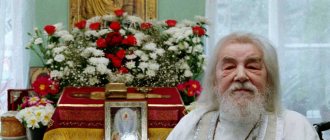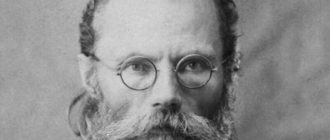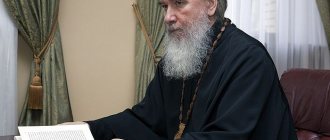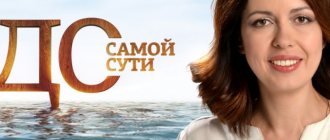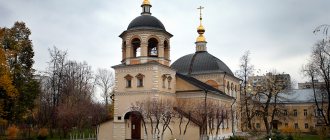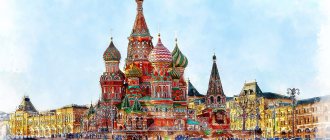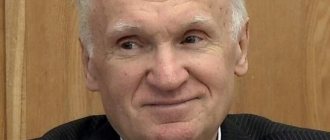Great Elder Archimandrite John Krestyankin
Archimandrite John Krestyankin remained in the memory of believers as a great preacher and mentor, a quick helper to everyone who came to him, a tireless prayer book and a role model for Christians.
Archimandrite John Krestyankin Archimandrite John Krestyankin. Biography
The future All-Russian elder was born in Orel. Ivan was the 8th child in the family. His mother was very religious, and it was with her help that little Vanya took his first steps in spiritual life. As a very young child, he loved to attend services in the local church.
At the age of six, Ivan was noticed by Bishop Nikolai (Nikolsky). Vanya often ran after the bishop's carriage to church. Struck by the child’s spontaneity and desire to be in the church, the bishop invited the boy to be a sexton in the church. Little Ivan was very happy and happily began to fulfill this obedience. After some time, he becomes a subdeacon with the bishop.
Ivan’s spiritual life took place under the guidance of Archbishop Nicholas, who even then noticed a great future in this young man. Therefore, the bishop, blessing all the pilgrims before moving to another diocese, was not surprised when the twelve-year-old boy Ivan told him about his desire to go to a monastery and devote his life to serving the Lord. The future martyr, Archbishop Nicholas, blessed him on the monastic path. But, according to the bishop, Subdeacon John had to first receive secular and spiritual education, be ordained as a clergyman, and then only take the monastic vows. That's exactly what happened.
After graduating from school in 1929, Vanya entered a vocational school for accounting courses, after which he got a job as an accountant. He liked the work, but there was so much of it that Ivan could not often attend services. Youthful maximalism and irreconcilable character in the face of injustice did not make one wait long for results. Ivan began to openly express his dissatisfaction with his superiors, as a result of which he was fired. His reputation was ruined, and Vanya could not find a job for a long time: he was rejected everywhere.
But by the grace of God, in 1932, Ivan managed to find a job as a chief accountant in the capital. There was enough time to visit the temple and meet with Orthodox youth.
Father John Krestyankin in
the first years of ministry
The war began. Due to myopia, Ivan did not go to war. The Lord prepared for him another place of service.
Ivan Mikhailovich fulfills his obedience as a psalm-reader in Izmailovo. In 1945, Metropolitan Nicholas performed his diaconal ordination, and in 1946, Patriarch Alexy I performed his priestly ordination. He finishes the seminary as an external student.
Interesting fact:
John Mikhailovich was ordained as a bachelor, i.e.
he was never married. Priest John begins his pastoral labors in the Izmailovsky Church, where he previously served as a psalm-reader.
Father John Krestyankin in his youth
Priestly service occurs in the post-war period. During a period of devastation in the country, when people suffered not only from hunger, but also from the loss of loved ones and relatives, Father John became support and support for all those in need and burdened. He enjoys great love among pilgrims, but for his insubordination and intractability he becomes disliked by the secular authorities.
For moral support, Priest John turns to the patriarch, who reminds him of the importance of priestly service and the difficulties that may be encountered along this path. The blessing of Patriarch Alexy I once again convinced the priest of the correctness of his position in life.
After this Fr. John enters the Moscow Theological Academy in absentia, writes a dissertation on the All-Russian priest, Venerable Father. Seraphim of Sarov. But he does not have time to finish this work due to serious changes in his life.
Imprisonment and life in camps
Being direct and fair, Father John was never afraid to speak the truth, and never indulged in people-pleasing. His sermons were distinguished by penetration and depth. They instructed the lost, denounced the unjust and lawless. Secular anti-religious figures felt that these fearless words of the priest were directed specifically at them.
Father John Krestyankin in his youth
Such anti-Soviet activities could not go unnoticed in political circles. In 1950, the priest was arrested on a tip from a fellow priest, who told the authorities about the nature and direction of his sermons. Father John prays for the priest-traitor to come to his senses and forgives him, to which he also calls his many parishioners.
The preliminary place of imprisonment for Priest John became Lefortovo and then Burtyr prison. In 1950, he received seven years in a concentration camp for anti-Soviet agitation. He is serving his sentence in the Kargopollaga concentration camp in the Arkhangelsk region.
Father’s cellmate Vladimir Kabo recalled about him: “I remember how he walked with his light, swift gait - he didn’t walk, but flew - along the wooden walkways to our barracks, in his neat black jacket, buttoned up with all the buttons. He had long black hair - prisoners were cut bald, but the administration allowed him to leave it - he had a beard, and in some places his hair was beginning to grey. His pale, thin face was directed somewhere forward and upward. I was especially struck by his sparkling eyes—the eyes of a prophet. But when he spoke to you, his eyes, his whole face radiated love and kindness. And in what he said there was attention and participation; there could also be a fatherly instruction, brightened with gentle humor. He loved a joke, and there was something of an old Russian intellectual in his manners.”
In the concentration camp, he worked at a logging site, but soon he was transferred to a department for the disabled to the position of an accountant (due to poor health). For good behavior in 1955, he was released early.
After his release, he, as a former prisoner, was not allowed by secular authorities to serve in Moscow. Father John continues his pastoral ministry in the Pskov diocese. But it doesn’t stay there for long. The authorities see him as a dangerous, active anti-Soviet preacher, as a result of which he is exiled to one of the rural churches in the Ryazan region. Later he served in other rural churches. And then in 1966 he became rector of the church in the city of Kasimov.
Over the course of ten years, Priest John six times received orders to be transferred to another parish. The priest perceived all this with patience and humility. Each time he invested his efforts in the restoration and beautification of post-war churches.
The life of Father John Krestyankin in the monastery
In 1966, the youthful dream of Fr. John - he takes monastic vows. In 1970, Father John became abbot, and in 1973 - archimandrite.
Since 1967, Archimandrite John has been asceticizing in the Holy Dormition Pskov-Pechersky Monastery for more than forty years.
It was during this period that he was able to completely devote his life to serving God and people. His kindness, mercy and spiritual wisdom attracted many people in need of help.
The fame of the great ascetic of piety quickly spread throughout the country and far beyond its borders. Thousands of spiritual children flocked to the elder’s cell for prayerful help and support. People needed spiritual guidance, so the elder devoted himself to this service sparing no effort.
Crowds of people always surrounded the priest. Every day after the end of the service until the evening, and sometimes until the night, he received pilgrims. The elder’s memory was phenomenal: he remembered everyone who came to him and prayed for them.
Father John Krestyankin and Father Tikhon Shevkunov
Metropolitan Tikhon (Shevkunov) in his book “Unholy Saints and Other Stories” describes numerous cases of manifestation of the priest’s insight and spiritual wisdom. Possessing spiritual gifts, he found the right words of consolation for each of those who came.
Death of Elder John Krestyankin
Before his death, the priest became very ill and could not get out of bed. In 2006, at the 95th year of his life, Archimandrite John left earthly life. Many Christian believers came to say goodbye to the dear old man. The All-Russian elder was buried in the caves of the Pskov-Pechersky Monastery.
The spiritual heritage of Father John Krestyankin
Archimandrite John left behind a rich spiritual heritage. It is represented by moral and ascetic works, letters, sermons, words, and collections of books. He wrote for monastics, clergy and laity. Everyone can find a grain of spiritual wisdom here.
The experience of constructing a confession
This book is the most striking work from the spiritual heritage of the priest. It was formed on the basis of sermons preached over several years in the first days of Lent. After reading the canon of Andrei Kritsky, the All-Russian priest shared his spiritual wisdom with numerous parishioners.
Archimandrite John took the commandments of the Law of Moses and the Beatitudes as the basis for his sermons.
Archimandrite John Krestyankin Letters of advice to spiritual children
Having grown old, Archimandrite John could not receive a large number of pilgrims. But even at this advanced age, he did not abandon his many spiritual children: he wrote letters of instruction to them, which were subsequently printed and published in a printing house.
The letters are addressed mainly to spiritual children, but they are of great importance in the spiritual life for all Orthodox Christians, and are relevant to this day.
The letters have already been republished several times due to numerous requests from readers, who have received significant benefit after reading these spiritual masterpieces. They contain answers to serious questions and instructions in difficult situations, strengthening of faith, and correction of the wrong path.
About the immortal soul
The book contains the thoughts of Archimandrite John about the three-part essence of man and the high dignity of the soul. Father emphasized that the soul is immortal and has a clear purpose: self-improvement to achieve eternal bliss.
Sermons
The sermons were delivered by the priest during services, and then the spiritual children were recorded and submitted for publication. They are a shining example of pastoral counseling. It is precisely such real and living sermons that believers long to hear.
Prophecies and testaments of Father John Krestyankin
Prophecies
Elder John prophesied several times about our days. Three times he had visions, which he did not talk about, but wrote on a piece of paper.
“Stand and see what I allowed for your admonition without the sudden death of people. Don't look for the guilty, don't look for the guilty! Pray! Always be careful in everything in life.”
Modern theologians, including Metropolitan Tikhon (Shevkunov), believe that this is a prophecy about the coronavirus.
Archimandrite John Krestyankin
Wills
In 2005, a year before his death, Archimandrite John left a spiritual testament to the Orthodox believers, which was read at the elder’s funeral.
In his will, the priest said that he had already received news from God twice about his imminent death. The first time was ten years ago, but someone’s fervent prayers were heard by the Lord and He extended the days of the elder’s earthly life. The second time the Lord notified the archimandrite that he had already swum across the river of life in 2004.
Facing the threshold of eternity, the All-Russian elder decided to leave a spiritual will in prayerful memory of himself.
“My dear children of God, believe God, trust Him! Accept everything in life: joy, joylessness, prosperity and evil, as the mercy and truth of the ways of the Lord, and fear nothing in life except sin. Only he deprives us of God’s favor and gives us over to the power of the enemy’s arbitrariness and tyranny. Love God, love Love and each other to the point of selflessness. The Lord knows how to save those who love Him” - Archimandrite John. June 25, 2005."
Great veneration of this great elder continues after his blessed death. A website has now been launched that collects evidence of his miracles and insight. In the future, Archimandrite John will be canonized.
Author Tatyana Gretskaya
Anniversary as an exam
Father, for the anniversary of the monastery, what did you want to do with the brethren, what were your plans? And what succeeded or failed, given the quarantine measures?
Of course, I wanted to put the monastery in order. From the outside (as many people say) it looks amazingly beautiful - well-groomed territory, magnificent temples. But we know how large the field of activity in this direction is. Moisture penetrates the walls of the Spassky Cathedral, the Assumption and All Saints Churches. The Assumption Church has not yet been consecrated or painted. However, the pandemic has made its own adjustments. Builders who came from Ukraine and, together with our workers, carried out a significant amount of work, are now not coming due to the closure of borders. So we prepared directly for the anniversary on our own. Linden seedlings donated to the monastery were planted on the central cathedral square. They created a covered gallery and a temporary altar because after the quarantine was lifted, services began to be held in the open air. It was not possible to complete the painting of the architectural dominant of the monastery - the bell tower with the chimes, whose golden head is visible many kilometers from the holy monastery. At the moment, work in progress (unfortunately, we did not have time for the celebrations) is the repair and restoration of the monastery pond and the laying of two Russian ovens, where we will soon bake bread. We have not yet had time to expand the classrooms for Sunday school students. This school year, the enrollment of children will be significantly reduced, because there are certain standards - sanitary requirements of Rospotrebnadzor, the Ministry of Education of the Russian Federation, which we will try to comply with literally point by point. The other day a meeting was held - the issue of parental assistance in the new reality was discussed in detail. We are now purchasing two air recirculators to protect against coronavirus. That is, we take everything quite seriously and do what we can, and then - as the Lord will manage.
If you remember the 500th anniversary of the monastery in 2015 and the recent celebration in 2022, can you compare them?
I will say that both anniversaries gave us the opportunity to see how we have united during this period, how we understand each other and why we live here. Thank God that these celebrations - both five years ago and now - were attended and led by Metropolitan Yuvenaly. If on the eve of the 500th anniversary of the founding of the monastery we had material wealth, and we were able to carry out a whole range of repair work, then by the 505th anniversary something else became clear - the internal unity of the brethren. The Bishop was greeted by the inhabitants of the monastery, children from kindergarten, secondary school, and Sunday school. Although this happened on a weekday, some parents also came to greet the bishop. The kids sang to Vladyka a song written by one of the kindergarten employees, which touched everyone. The holiday, celebrated after the lifting of quarantine, became a real triumph for the brethren of the monastery and its parishioners, for the village of Novy Byt and the Chekhov urban district. In addition, it was a certain test of what we are capable of, what we can do. Before this, we gathered children together with leaders at various events and practiced the approach to the special day. In a word, there was a mobilization of forces. The Metropolitan spoke warmly about the holiday, and leaders at the federal, regional, and district levels also said warm words. And most importantly, the brothers received inner joy from their labors. There was one more important point. Metropolitan Yuvenaly presented awards to our benefactors - medals, certificates of gratitude. But not only benefactors received metropolitan letters. They were received by the head of the kindergarten, the director of the secondary school, and the head of the structural unit of the Chekhov Technical School. Volunteers from secondary schools and technical schools took part in the celebration, and this is significant for us. During the nine years that the abbot was in place, the missionary orientation of the monastery, the importance of educational work, social, military-patriotic, were determined.
Father, after all, preparing for an anniversary is always tension and excitement. Did you breathe more freely after your anniversary?
When preparing for important events, the bustle becomes so intense that, unfortunately, it is not possible to devote more time to prayer. The anniversary has passed, but the element of vanity is still present. We need to get rid of this in order to justify our calling.
***
Among the main problems of the David’s Hermitage, the abbot, strict and exacting of his inner state, named this: there is a shortage of a confessor in the monastery. Although life here proceeds in a peaceful direction - there are no scandals or misunderstandings, but without a spiritual mentor it is difficult to maintain a truly monastic spirit in the monastery. This is our time - it is not easy to find a person (especially monastics) who has the skill of spiritual guidance. And about the galaxy of spiritual elders from the end of the last and beginning of this century, memories reach us - oral and written testimonies about their grace-filled life in Christ. And thank God that there are such happy people who heard the instructions of the elders, absorbed a lot from their spiritual experience and, like Abbot Sergius, try to share this hidden wealth with others.
Interviewed by Nina Stavitskaya
Photo: Vladimir Khodakov Also presented are photographs from the monastery archive
Print

